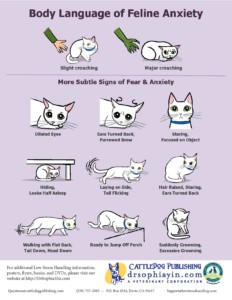Thankfully, it is now widely recognised in humans that mental health is just as important as physical health; the same is true for our pets!

Our lifestyles are becoming more and more hectic and often we expect our pets to be able to keep up, coping with busy households, traffic, fireworks, moving house, other pets and all sorts of other potentially stressful situations. If our pets aren’t well-equipped to cope with the things they come across, over time they can develop conditions such as noise phobia, generalised anxiety disorder or even fear-related aggression.
An individual may be more likely to develop these conditions due to a genetic predisposition, a previous negative experience, or a misunderstanding in the way that animal interprets the environment in which it finds itself and the signals that it receives from humans or other animals. Behavioural disorders can also be linked to underlying physical health conditions, for example muscular or arthritic pain, dietary sensitivities or skin problems, to name just a few. They can also be the cause of physical disorders, such as stress cystitis in cats.
Prevention is always better than cure and there is a lot you can do to socialise and habituate your puppy or kitten to all the things they may come across later in life. This should be done in a calm, gentle way, being careful not to overwhelm your pet. Make sure that they are enjoying each experience. This will help your furry companion to form positive associations with these things so that they are able to cope well with them when they are older. Please speak to a member of our team if you are at all unsure how to go about this.
If you have an older pet who is already anxious about certain things, don’t despair; there are many things we can do to help turn this around. The process is a little different from above, as we first need to decrease your pet’s fear of the stimulus (be that fireworks, visitors or anything else). This is done using a technique called desensitisation.
Desensitisation is the process of exposing an animal to a gradually escalating stimulus at a level they can cope with. At each stage, they should be alert and aware of the stimulus but not otherwise reacting to it. Over time (usually a period of weeks), the stimulus level can be slowly increased until it is at the level at which they would experience it in the real world. Counter-Conditioning, on the other hand, is the process of turning a stimulus from a negative to a positive, by associating it with a reward (eg. fuss, treats, play as appropriate). In practice, these two techniques are often employed side by side as they make a powerful pairing.

It’s extremely important that we start the process at the SMALLEST stimulus that your pet takes notice of WITHOUT them showing overt anxiety. Watch for small signals, eg. lip licking, yawning or lifting one paw in dogs; wide staring eyes, hunched posture or flattened ears in cats – these tell you to go back to a slightly lower level of stimulation where your pet looks more comfortable.
Recognising and treating any behavioural condition, whether related to anxiety or to something else, is best done at as early a stage as possible, as this gives the highest chance of being able to resolve the problem. It’s never to early to make us aware you think your pet may be struggling with a behavioural issue. We want to intervene early on to give your companion the tools to cope with situations they may find stressful and lead rich, happy lives.
Our nurses at South Queensferry run confidence clinics, designed to help desensitise and counter-condition pets who are anxious at the vets’ and teach them that in fact it is a safe and often fun place to be. You can also book confidence clinics to help with habituating your puppy or kitten to the things they may require for their healthcare.
If you are concerned that your cat or dog has a behaviour problem, our vet Nicola would be more than happy to see you and your pet for a behaviour consultation. If you think your pet would benefit from a behaviour consult, you can phone us at any branch to ask for more information or to make an appointment.
